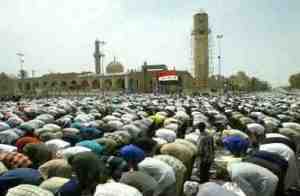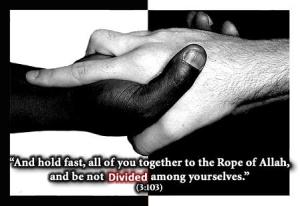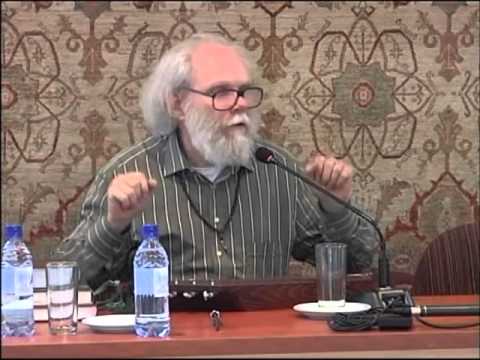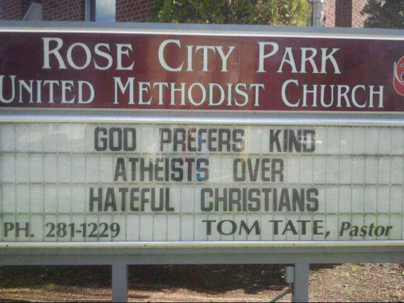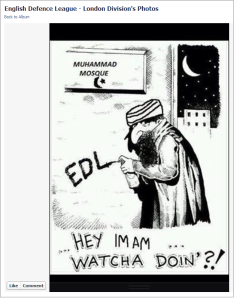Recently I had the pleasure to interview the renowned international religious scholar and author, Dr. Thomas McElwain. He discusses his background, his work, and so much more!
Perspectives Of A Fellow Traveler: Can you tell our readers about your Educational and religious background?
Dr. Thomas McElwain: I was educated in Seventh-day Adventist schools from the first grade to the end of college, except for the sixth grade. Monterey Bay Academy in California, Antillian College in Puerto Rico, and Séminaire Adventiste in Collonges, France. Then summer school in Andrews University. I then studied Ethnography in Uppsala University in Sweden through the doctoral level, but did not present a dissertation. Instead, I went to Stockholm and studied Comparative Religion under Åke Hultkrantz and finished a Ph.D. with a dissertation on Iroquois mythology. I completed the grade of docent in Stockholm in 1981. That’s it for education. My parents were Seventh-day Adventists, but I left that as soon as I got old enough to think for myself. My grandmothers were very influential. My mother’s mother had a Quaker background that influenced me highly, especially through the Hicksite tradition and finally back to Edward Elwall, who was a Sufi from a Turkish order. My father’s mother was a Baptist, but whose father was a Sufi as well. She was a vigorous admirer of Imam Khomeini. These two women were the most influential people in my religious world. That’s it in a nutshell. I’m sort of a Quaker hard-shell Baptist Sufi who has practiced Islam for several decades. Just like Edward Elwall, except I don’t wear a turban or 18th-century Turkish dress.
POAFT: What exactly is the Beloved and I?
Dr. McElwain: The Beloved and I is a rhymed verse translation (to the extent I’ve been able to translate from the Hebrew, Greek and Arabic) of the wider canon of the Bible, books of Enoch and Jubilees, apocryphal gospels and Qur’an, all armed with about 8000 commentaries in a verse form combining features of the sonnet and the ghazel. It is a contemplation of the “I” from a Sufi perspective, which may be claiming too much. It takes something approaching a fool or an idiot to need two and a third million words to fail to explain what the English word “I” means. I have written other books, both academic and apologetic, prose as well as verse.
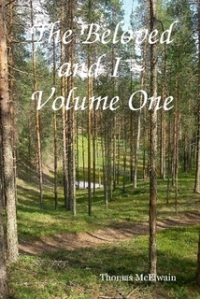
The Beloved and I
POAFT: Not everybody makes a translation of The Bible nor of the Qur’an, to the best of my knowledge no one has ever done both. More so they have never, in their entirety, been included in the same anthology. In addition, you have included a few of the most important works of the Apocrypha and Psuedipigraphia of The Hebrew Bible (Old Testament) and of the New Testament Apocrypha, What was your inspiration?
Dr. McElwain: To my knowledge, no one has every set either one to rhymed verse either. So my inspiration was probably a lame attempt to get into the Guiness book of records. That must be it, because I surely did not have the temerity to imagine that anyone would ever read all of that. I must admit with humility, however, that a few people actually have. Actually, it was inspired by the practical need of producing a weekly reading for the dhikr in which I participate each week.
POAFT: Of The Texts not included in the Bible, why did you chose these to include as opposed to the countless others?
Dr. McElwain: chose all of the texts in function of one criterion: the text must state or imply adherence to the Decalogue [Ten commandments]. I see the Decalogue as a brief and comprehensive expression of Abrahamic faith. It is the only such text in all of the classical scriptures of the world that claims to have been spoken by God directly to a large, representative segment of humanity, without the medium of an angel, prophet, or vision. That gives it an objective distinction. So I have used it as a criterion or rule of thumb. Obviously, I have not been able to include all texts that might fit the criterion. But I think all that I have included do so. The first “commandment” I find to be fundamental, from which all else is derived: Thou shalt have no other gods but Me. I think that the principles of the Decalogue are foundational to all religious traditions, though all of them might not affirm everything in the Decalogue of Exodus 20. All religions prohibit murder, thievery, false testimony, etc.
POAFT: Is there any benefit to studying these texts together?
Dr. McElwain: Both believers and scholars have tended to focus on their differences. This is a skewing of reality. There has to be a fundamental consistency at some level, or they would never have been compiled together in the one book of the Bible, nor would the Qur’an have referred to the earlier Scriptures in confirmation of its own validity. It seems strange to me that this obvious fact is rather often ignored. Study of these texts in view of finding such fundamental consistency and focusing on it ought to contribute to both understanding other people and their faiths and fostering peaceful existence among them.
POAFT: Have you received any criticism for grouping these texts together?
Dr. McElwain: Yes. I’ve lost all my friends!
POAFT: Is there any text not currently in The Beloved and I that you would like to add to it?
Dr. McElwain: Yes. The Gospel of Barnabas. The battle of the books, which I earlier saw as serving at least some good purpose in keeping controversy focused on texts rather than killing each other, has not succeeded in keeping peace. Physical violence between so-called Muslims and so-called Christians has increased. Given the recent events in the world, I think the recognition that The Beloved and I gives to the common foundations of humanity is more acutely important than ever. The defense of one segment of the Abrahamic Scriptures, coupled with an attack on another segment of them, is misguided and contributes to an atmosphere of suspicion and eventually physical violence. It is unacceptable. My refusal to engage in anti-Bible or anti-Qur’an activity has aroused some opposition and hatred. I do not for a moment see myself as a victim or a failure. It is a simple fact that I lost my Christian or Baptist audience when I wrote Islam in the Bible. I lost my Muslim audience when I wrote The Beloved and I, even though it consistently supports Islamic views. My work does not support the general trend towards polarization and violence, and for that reason is not popular or even acceptable today. That may or may not change in future. I have done my duty and am satisfied.
POAFT: Why do you think people are attracted to polarization and violence?
Dr. McElwain: The surface reason is because of business interests determining government policy and the need to manipulate the population to accept that. The fundamental reason of course lies in a spiritual issue. The spiritual issue is the fact that God has given the divine gift of self-consciousness to each individual. That results in either experiencing oneself as god and feeling threatened by other people or in seeing the divine in every other individual. The former experience is the root of all violence.
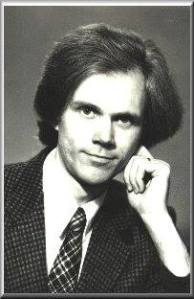
A young Dr. McElwain
POAFT: From my experiences with languages I know that between two languages there are rarely word for word equivalents. Translating is no easy task, and translating is largely interpretation. Would you agree with this?
Dr. McElwain: Definitely. That is why I think Jews and Muslims are wise to maintain the original-language recitation of Scripture, and Christians unwise to relinquish it.
POAFT: Can you describe how much more difficult it is to translate something into poetry than prose?
Dr. McElwain: I think it depends on the person. The craft of versification can be acquired by anyone, but it must be acquired. I actually expected versification to be a greater challenge than it was. My translation of the Bible into verse is often actually more literal and word-for-word faithful to the original than most modern prose translations.
POAFT: How long did it take to complete The Beloved and I?
Dr.. Mc. Elwain: Nine and a half years.
POAFT: What are some of your favorite verses from the Beloved and I?
Dr. McElwain: Surah 1 Al-Fatihah or the Opening
1 In the name of God most gracious, merciful,
2 All praise is God’s, Lord of the Universe,
3 Most gracious Lord and Lord most merciful,
4 King of the Day of judgement, 5 we rehearse
To You alone our worship and petition.
6 Guide us, O Lord, in Your right admonition,
7 In ways of peace in Your bounties’ fruition,
Not in their path who know Your wrath
Nor in their way whose steps go to perdition.
Surah 112 Al-Ikhlas, or Purity (of Faith)
In the name of God Most Gracious, Merciful.
1 Proclaim alone He God is one.
2 God without need of anyone.
3 He is not born, He sires no son,
4 There is none like him, no, not one.
[Commentary To Surah 112]
Truly, my Beloved, there is none like You!
The One and Only, Allah Allah Huu!
Eternal, Absolute, in need of none,
Truly, my Beloved, You alone are One!
For You give birth to nothing I may know,
In You there is no change, no come and go,
You have no birth, You have no source at all,
Time, place, inside or out the earthly ball.
Creation is an idol if by it
I might attempt to give You space or fit.
No weight or colour, sequence, sour or sweet
Can touch Your essence, trace Your hands and feet.
Invisible to eye and mind above,
I cannot know You, I can only love.
POAFT: Other than The Beloved and I, what are some of your favorite English translations of the Bible, The Quran, and the Other texts? And what is it about these that you like?
Dr. McElwain: I like the elevated language of the King James Version of the Bible. For the same reason I like Pickthall’s translation of the Qur’an.
POAFT: You have also authored several more books have you not? what are they?
Dr. McElwain: Islam in the Bible, London Lectures, Secret Treasures of Salaat, Invitation to Islam are some apologetic works that come to mind. I recently did Psalms in Brief. Academic books are Mythological Tales and the Allegany Seneca; Our Kind of People; and Adventism and Ellen White. I have pretty much turned away from public dialogue in recent years, as any discourse at all seems to feed violence in the present atmosphere. I do dhikr and wait for change. May Allah have mercy on the world, since humankind does not.
POAFT: Unfortunately I have not read all of your work, but I have read your Islam in the Bible. I knew Judaism, Christianity, and Islam was linked and as a Muslim I believe that God sent prophets to teach his message long before the advent of the prophet Muhammad. I was also aware of the practices of ancient Israel. However, it did not dawn on me that there was overlap between their practices and the pillars of Islam, other than the belief in strict monotheism. Is it common for people not to see this? If So why do you think it is?
Dr. McElwain: Jews are generally aware of this, while Christians are not. I suspect it has something to do with the Christian habit of reading the Hebrew Scriptures allegorically and not taking the literal meaning seriously. They would be likely to skip over the literal similarities, then, as most of them are in the Hebrew Scriptures, or the Old Testament, as it is called.
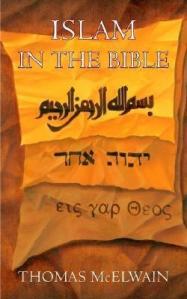
Islam In The Bible
POAFT: What inspired you to write Islam In The Bible?
Dr. McElwain: I was asked to lecture about the Bible in various Islamic venues in several countries. I used the material from those lectures then to produce the book.
POAFT: Do you think it is possible to be a practicing Muslim and to read and study the Bible?
Dr. McElwain: It is possible to be a practicing Muslim and study and read all of the classical religious books of the world. Al-Biruni is certainly one of the major founders of the science of comparative religion, which is thus to be considered an Islamic science. The fact that comparative religion is no longer seen as an Islamic science merely shows that current Islam is deficient and no long represents the original flowering of the faith. This is precisely one of the central flaws of contemporary Islam.
But the Bible is the most important pre-Islamic source for Muslims. The Bible was read and studied by Islamic scholars in all of the medieval Islamic empires as well as in the Ottoman Empire, where a knowledge of the Bible was required of high level clerics. Probably one of the best translations of the Bible into any language is that of Ali Bey, who was a revert and functionary in the Ottoman Empire. His translation, with some adjustment, was used by Christians until recently. The Evangelical translation into Turkish that is now replacing it is noticeably inferior. One of the major changes is the replacement of the Ottoman Turkish word Allah with Tanri. This feeds the abusive and divisive trend in current discourse which maintains that Allah has nothing to do with the God of the Bible and is merely a pagan moon god. Using Bible translation to affirm such nonsense is immoral.
POAFT: Does studying the Bible benefit Muslims in any way?
Dr. McElwain: It provides them with a realization of the continuity of revealed faith. It also provides the foundation upon which the Qur’an stands. Much of the Qur’an is a commentary or an extension of the Bible. Without a knowledge of the Bible, much of the Qur’an is subject to misapprehension.
POAFT: Do you think Jews and Christians should read the Qur’an? If so do you believe it is beneficial for them in any way?
Dr. McElwain: It is certainly beneficial for them, if they read it with the intention of discovering what Islam teaches. If they read it with the intention of finding excuses to incite genocide against the Muslim population, then they had better not read it. Reading the Qur’an without malice can only be beneficial.
POAFT: Does studying the Apocryphal Books and Psuedepigraphia have any benefits for Jews, Christians, and Muslims?
Dr. McElwain: There are two major benefits. The Apocryphal and Pseudepigraphical writings illuminate history and the faith configurations of the times in which they were written. Secondly, they are often very spiritual in content and provide real devotional material. For example, the Gospel of Barnabas, is a case in point. It is generally read either to disprove it and show it to be a fraud, or to prove that Muhammad was predicted before hand or to prove that Jesus did not die on the cross. I have never seen anyone quoting it for any other purpose. And yet, it contains a great deal of material of the highest spiritual quality. I would say that hardly any other single writing has impressed me so much in a practical way as this book.
POAFT: I have started reading your translation of The Writings of Edward Elwall. He seems like a very interesting fellow. Can you describe who he was for our readers and tell us what inspired you to translate his work?
Dr. McElwain: Actually, it is not a translation, but simply a copy. I visited the Dr Williams’s Library in London where most of his writings are found. I copied them into a computer file and finally posted them on the internet, where people could access them. Edward Elwall has been rather much my mentor for a long time. He is listed as a Unitarian Quaker who lived at the beginning of the 1700s, but he was also a member, apparently of the Mill Yard Sabbatarian Baptist Society in London and the Presbyterian church in Wolverhampton. But he belonged to a Turkish dervish order and commonly wore a turban and Turkish dress.
POAFT: Is there any subject you would like to write about one day that you have not yet written?
Dr. McElwain: Rather many! I’d like to write an acrostic on the Vulgata, every letter forming the first letter of each line of rhymed verse! I wonder how long it would take… (laughs)!
POAFT: (laughs) All of your works are available online, one can purchase a printed edition or get a pdf copy for free right?
Dr. McElwain: That’s right, although I’ve had complaints about not being able to download. In that case, I just send people a pdf file.
POAFT: Thank you very much Dr. McElwain for taking the time to talk with me, it is always a pleasure to talk with you. I hope we can do it again soon.
Dr. McElwain: My pleasure!
Once again I would like to thank Dr. McElwain for his time. Be sure to check out Dr. McElwain’s work and get your copy of The Beloved and I at http://www.lulu.com/spotlight/thomasmcelwain




